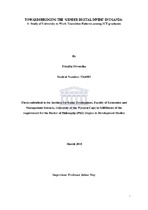| dc.description.abstract | This dissertation examines the gender digital divide in the Information and Communication
Technology industry in Uganda by analysing admission and graduation dynamics among men
and women in ICT degree programs at Makerere and Busitema Universities and the transition
of ICT graduates from university to work with specific focus on Mobile Telecommunication
Network- Uganda and Uganda Telecom Limited companies. It explores the socio-cultural
stereotypes and perceptions that influence the participation and progress of women
professionals in the ICT industry and examines the diverse ways in which women in the ICT
industry respond to these stereotypes and perceptions. A qualitative research design and
methodology was employed to realise these objectives. The data which informed this study
was obtained through detailed in-depth interviews and focus group discussions, analysis of
admission, graduation and employment data, and official reports.
The study reveals that the way socio-cultural structures and institutions are set up — often in
favour of men over women — as well as the differential construction of both women and men
— inferior feminine vis-à-vis superior masculine — particularly, in a predominantly
patriarchal Ugandan society, continue to shape and inform the uptake of ICTs in the country.
The dissertation shows that more men than women are admitted into ICT degree programs at
Makerere and Busitema universities. Gender ‘appropriateness’, role models, failure to attain
minimum admission requirements, influence of parents and misconception about ICT work
variously influence career choice among men and women.
Employment patterns among men and women in the ICT industry indicate that the top
managerial and technical positions are largely dominated by men while women constitute
many of employees at low level, less technical positions. Transition patterns also show that
the numbers of women gradually reduce at each critical career transition point. Gender
related socio-cultural stereotypes such as male scientist vis-à-vis technophobic woman,
working man vis-à-vis domesticated woman, and dependent woman vis-à-vis independent
man underlie these paradoxes. These disempowering’ socially constructed labels continue to
obstruct many of women from participating in the ICT industry. Finally, this thesis has
revealed that a wide range of ‘everyday’ response mechanisms including juggling family and
work responsibilities, subterfuge, negotiating, sacrificing career for family, as well adopting
the ‘culture of men in technology’ are deployed by women to navigate and challenge the
existing socio-cultural stereotypes and constructions which accentuate the gender digital
divide in Uganda. | |

